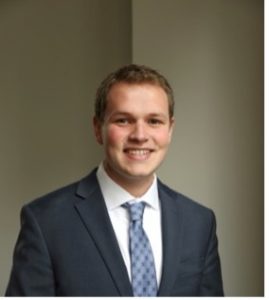When you think of “Golden Arches,” a black “swoosh,” and a red “target,” modern brands should immediately come to mind. (Yet, if you’re having a hard time imagining what these symbols represent, they are McDonald’s, Nike, and Target, respectively).

What makes these logos stand out? I think the answer is multifaceted. Based on my undergraduate marketing education, I believe they stand out because of their strong, easy to recognize branding, and intellectual property protection. The creation of a strong brand requires a strategy that likely involves both business/marketing and legal professionals to ensure its success.
Marketers generally create unique imagery, names, and designs for products or businesses. My marketing courses taught that marketers usually need to think of psychological, logical, and creative reasons why people would choose their brand over another. Color is relevant because it automatically becomes associated with a brand to a consumer. For example, you may see a specific shade of green and instantly connect it to Starbucks. Often, a marketer’s goal is to position a brand or product in a way that inclines a purchaser to buy their product over a competitor.
Photo by: Vardan Papikyan licensed under UnsplashYet, beyond the work of marketers, businesses may seek trademark protection (legal protection of some words, phrases, designs, or symbols that identify your good or service) at the United States Patent and Trademark Office (USPTO). The USPTO is the government agency that grants logos, slogans, and other branding features. The trademark application process is the work of intellectual property attorneys dedicated to ensuring that brands meet the criteria to distinguish themselves from competitors. Without intellectual property protection, any competitor could take a marketer’s work as their own. The combination of marketing and IP protection fit together like puzzle pieces, forming a more successful and protected brand.
Puzzle Piece #1: Marketing

I spent most of my undergraduate experience at the University of Wisconsin-Madison both studying and working in the marketing sphere. I worked on numerous case studies developing marketing strategies and branding concepts to help businesses grow. For example, I investigated Disney’s Theme Park entry into the Chinese market and Ninja Air Fryers in the Kenyan market. I conducted thorough deep dives into how these businesses created their marketing strategies in their international expansions to understand the inner workings of an effective market strategy and brand.
Now, I believe the next crucial piece in my journey toward understanding effective brands is to gain experience in intellectual property law. I find it fascinating that companies can sue for trademark infringement to stop other businesses in the same industry from using something that makes their brand iconic, like the classic “Tiffany Blue.” I understand, from a business point of view, how Tiffany Blue represents luxury and is tied to the brand. I’m interested in studying intellectual property to better understand why Tiffany can sue another jewelry company that uses that blue in its design or packaging. I’d love to better understand trademarks like this so I can see where marketing work can be better executed to support the legal protection of that work.
In the long term, I have aspirations to start my own brand or business as an entrepreneur. In this way, I can connect my background in understanding brands and marketing strategies to a career protecting that work to ensure a business’s success. These two interconnected fields would give me a great advantage: expertise in setting up a strong brand and knowledge of how to protect it.

Puzzle Piece #2: IP Law at Loyola Chicago
Now, as a 1L, I’m confident in my decision to attend Loyola and tailor my education toward the protection of businesses’ creative work and brands through the law. Since starting law school, I have joined both the Intellectual Property Law Society & the Business Law Society (BLS). In these organizations, I’ve learned more about the interconnectedness of IP and business, like how corporate IP lawyers can work In-house at large companies. By working In-house, an IP attorney can focus on furthering the business’s goals. These organizations have also given me opportunities to meet other students and alumni who have similar passions and interests.
Within the IP community at Loyola, I’ve found it truly special that students are so willing to share their experiences in law school and summer job experiences. I have emailed many 2L and 3L IPLS and BLS club members just to chat. Every student I’ve reached out to was willing to meet with me to give advice and share their law school experience and career goals. The Loyola community has provided me with valuable guidance and support, and I now feel more confident in my path.
I attended panels and events like the Loyola Alumni IP Panel. At these events, I met attorneys, professors, and other IP scholars in Chicago who have business backgrounds like me. Before attending law school, I was concerned that everyone studying or working in IP had to have a background in science. After meeting these attorneys and learning more about IP law, I quickly learned how wrong that belief was. IP attorneys can come from all sorts of backgrounds and career experiences. The more attorneys I met, the more I have been able to connect with professionals with similar interests and entrepreneurial spirit as me!
In Chicago, Loyola students are in a prime position to network and seek employment opportunities from some of the largest publicly traded companies in the world, all based in the Chicagoland area. Loyola students take advantage of this opportunity and often stay for their career. These Loyola alumni are often willing to connect and chat about their work both in the IP and corporate fields.
While I’m relatively new to the intellectual property field and am just beginning to forge my career, I’m confident that the educational opportunities and mentorship available at Loyola will provide me with an even clearer direction in my career path. I aspire to continue to find connections between IP, successful businesses and brands, and the law, by eventually taking courses like “IP Survey,” by participating in the “Business Law Clinic”, and seeking job opportunities and mentorship from successful Business IP attorneys and firms throughout the city.
Putting together a puzzle is often a challenging task. However, the puzzle pieces of my career, a degree in marketing and a legal education focused on IP at Loyola, seem to fit seamlessly.

Griffin Topel
Assistant Blogger
Loyola University Chicago School of Law, J.D. 2026
